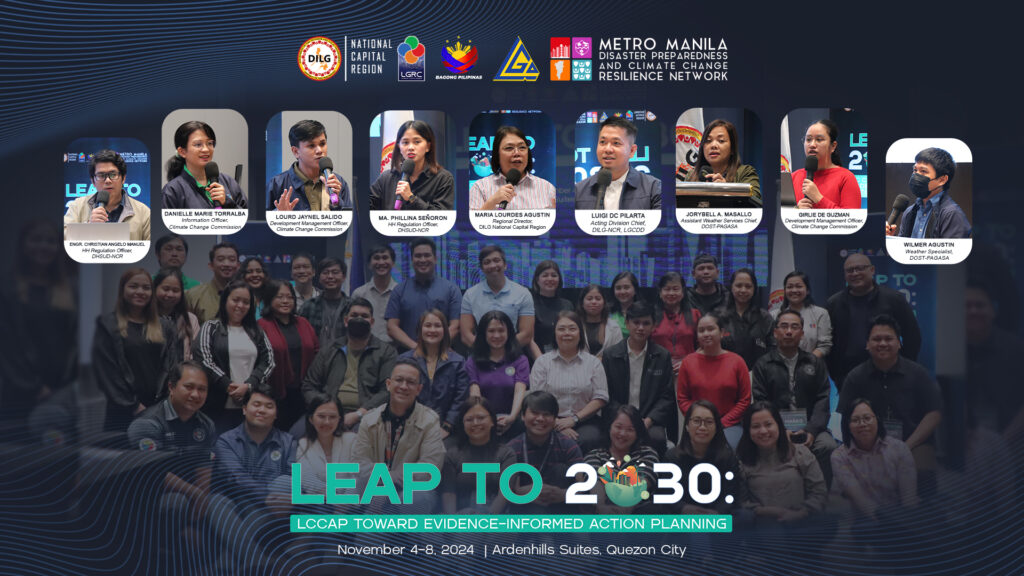
As part of its initiatives to strengthen the capacity of local government units (LGUs) to effectively integrate climate and disaster resilience into their local plans, the Department of the Interior and Local Government – National Capital Region (DILG-NCR), through its Local Government Capability Development Division (LGCDD), conducted a training-workshop titled, LEAP TO 2030: LCCAP toward Evidence-Informed Action Planning from November 4 to 8, 2024, at Ardenhills Suites, Brgy. South Triangle, Quezon City.
Attended by representatives from the Cities of Valenzuela, Las Piñas, Makati, Pasig, Marikina, Navotas, Caloocan, Taguig, and the Municipality of Pateros, the activity was designed to guide the said LGUs in developing their respective Enhanced Local Climate Change Action Plans (eLCCAP).
In his welcoming remarks, LGCDD Acting Chief Luigi D.C. Pilarta underscored the importance of formulating an adaptive and proactive action plan grounded on risk, science, and evidence.
âOur plans must reflect the different risks and hazards affecting our communities. We must ensure our analysis and subsequent actions are based on practical evidence. As our communities experience different impacts brought on by climate change, it is only right that we base our plans on these issues and experiences,â he emphasized.
The five-day training-workshop was divided into four (4) modules, which covered Steps 1-9 of the eLCCAP formulation process: 1) Getting Started; 2) Stakeholders and Participation; 3) Risk and Vulnerability Assessment; 4) Goals and Objectives; 5) Option Identification; 6) Option Assessment; 7) Implementation; 8) Monitoring and Evaluation; and 9) Adjust and Modify.
Discussions on Climate Change 101, Climate Change Projections, Climate Information Risk Analysis Matrix (CLIRAM) and Climate Extremes Risk Analysis Matrix (CERAM), Climate and Disaster Risk Assessment (CDRA), and the Greenhouse Gas Inventory (GHGI) Process were also included.
The sessions were facilitated primarily by Danielle Marie Torralba and Lourd Jaynel Salido of the Climate Change Commission (CCC). Joining them were Jorybelle A. Masallo and Wilmer A. Agustin of the Department of Science and Technology – Philippine Atmospheric, Geophysical and Astronomical Services Administration (DOST-PAGASA); Ma. Phillina Senoron, EnP, and Engr. Christian Angelo Manuel of the Department of Human Settlements and Urban Development (DHSUD); and Girlie De Guzman of the CCC.
To formally conclude the activity, DILG-NCR Regional Director Maria Lourdes L. Agustin, CESO III expressed her gratitude towards the participants and urged them to create resilient, adaptive plans for a sustainable future.
âThe risks in our communities change quickly, as we have seen with recent flooding events in areas previously considered low-risk. An evidence-informed action plan enables us to respond to these dynamic conditions, tailoring our efforts to real, current community needs,â RD Agustin mentioned.
The DILG-NCR, through the LGCDD, commits to providing the necessary guidance and support to NCR LGUs to ensure the effective formulation and implementation of their enhanced Local Climate Change Action Plans. This initiative aligns with the Departmentâs broader efforts to help LGUs adapt to climate change and mitigate its impacts, ensuring the safety, security, and well-being of communities in the National Capital Region.
